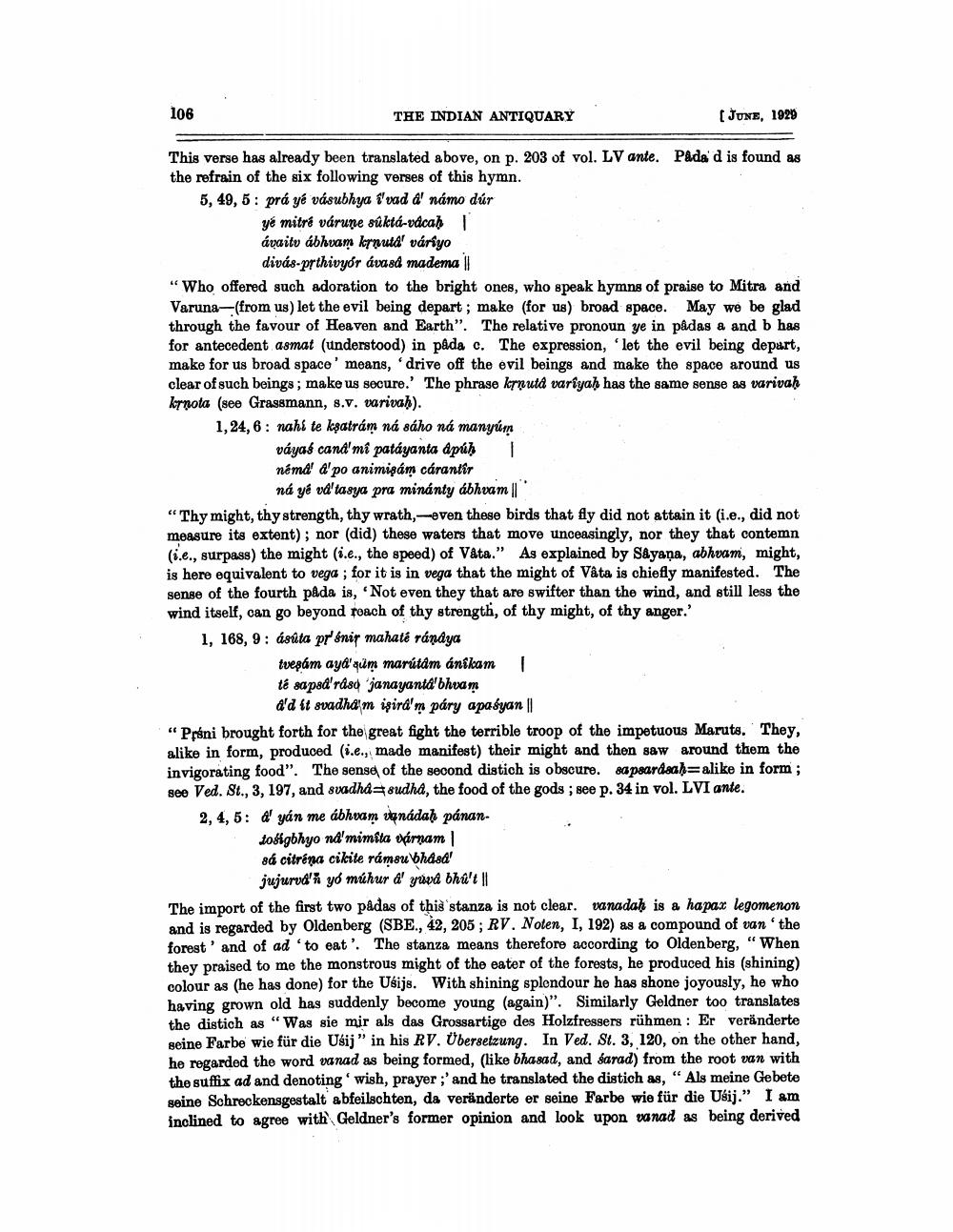________________
106
THE INDIAN ANTIQUARY
JUNE, 1929
This verse has already been translated above, on p. 203 of vol. LV ante. Pada d is found as the refrain of the six following verses of this hymn. 5, 49, 5: prá yé vásubhya i'vad a' námo dúr
ye mitré várune súktá-vdcah ávaitv ábhuam krnutá váriyo
divás-prthivyór ávasd madema || "Who offered such adoration to the bright ones, who speak hymns of praise to Mitra and Varuna-(from us) let the evil being depart; make (for us) broad space. May we be glad through the favour of Heaven and Earth". The relative pronoun ye in pâdas a and b has for antecedent asmat (understood) in pâda c. The expression, let the evil being depart, make for us broad space' means, 'drive off the evil beings and make the space around us clear of such beings; make us secure. The phrase krņutd variyah has the same sense as varivah krnota (see Grassmann, 8.v. varivah). 1, 24, 6: nahi te kşatrám ná sáho ná manyúın
váyas cana' mi patáyanta apríh nemd' a' po animişám cárantir
ná yé vá'tasya pra minánty ábhvam . “Thy might, thy strength, thy wrath, even these birds that fly did not attain it (i.e., did not measure its extent); nor (did) these waters that move unceasingly, nor they that contemn (i.e., surpass) the might (i.e., the speed) of Vata." As explained by Sayana, abhvam, might, is here equivalent to vega ; for it is in vega that the might of Vâta is chiefly manifested. The senge of the fourth pada is, Not even they that are swifter than the wind, and still less the wind itself, can go beyond roach of thy strength, of thy might, of thy anger.' 1, 168, 9 : ásúta prenik mahaté rándya
tveşám aya' rum marútám ánikami té saped raso janayanta' bhuam
a'd it svadham isira'n páry apasyan || "Préni brought forth for the great fight the terrible troop of the impetuous Maruts. They, alike in form, produced i.e., made manifest) their might and then saw around them the invigorating food". The sense of the second distich is obscure. eapsardsah=alike in form; see Ved. St., 3, 197, and swadha=sudha, the food of the gods ; see p. 34 in vol. LVI ante. 2,4,5: d'yán me ábhvam nadah pánan
dofigbhyo na'mimita várnam 8á citréna cikite rámsubhasa
jujurvd'h yo muhur d' yuva bhu't || The import of the first two padas of this stanza is not clear. vanadah is a hapax legomenon and is regarded by Oldenberg (SBE., 42, 205 ; RV. Noten, I, 192) as a compound of van 'the forest' and of ad 'to eat'. The stanza means therefore according to Oldenberg, "When they praised to me the monstrous might of the eater of the forests, he produced his (shining) colour as (he has done) for the Usijs. With shining splendour he has shone joyously, he who having grown old has suddenly become young (again)". Similarly Geldner too translates the distich as "Was sie mir als das Grossartige des Holzfressers rühmen: Er veränderte seine Farbe wie für die Usij" in his RV. Übersetzung. In Ved. St. 3, 120, on the other hand, he regarded the word vanad as being formed, (like bhasad, and sarad) from the root van with the suffix ad and denoting' wish, prayer;' and he translated the distich as, “Als meine Gebete seine Schreckensgestalt abfeilschten, da veränderte er seine Farbe wie für die Usij." I am inclined to agree with Geldner's former opinion and look upon vanad as being derived




